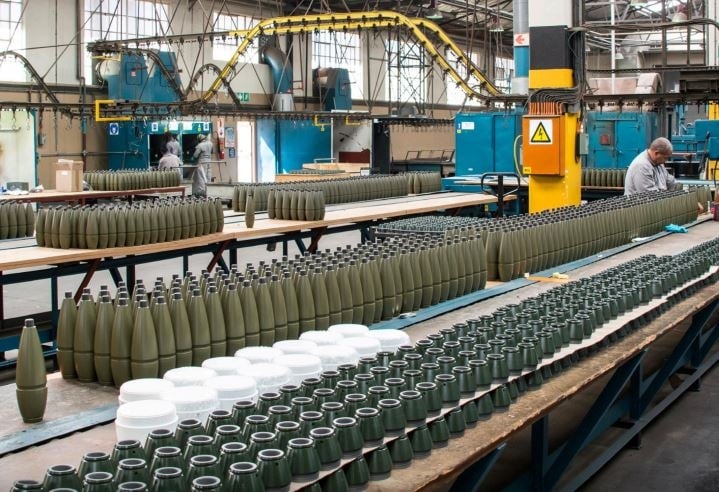Rheinmetall Denel Munition (RDM), a South African company, is working around the clock and investing significant funds to meet the global demand for artillery ammunition. The CEO of RDM, Jan-Patrick Helmsen, disclosed this information during a recent military attache demonstration at the company’s Boskop facility near Potchefstroom. Helmsen explained that with the current state of global instability and uncertainty, countries are allocating more resources to national security, leading to a thriving defence industry worldwide. In Europe, the trend of shrinking defence budgets has reversed, and global military spending surpassed $2 trillion last year.
Rheinmetall Denel Munition (RDM), a joint venture between Rheinmetall and Denel, is expanding its operations to meet the growing demand for artillery ammunition. The company is running 24-hour-a-day shifts at its plants across South Africa and is investing hundreds of millions of rands in its expansion, according to a report by defenceWeb.
There is currently a substantial global demand for artillery ammunition as countries realize their stockpiles are depleted. RDM has secured tens of millions of euros in orders over the past year, primarily for 155 mm and 40 mm ammunition. Recently, an Asian customer ordered 400,000 rounds of 40 mm ammunition worth 25 million euros.
To fulfil these orders, RDM employs a workforce of 2,441 across its five sites. The Laingsdale facility, specializing in fuses and safe/arming devices, has 160 employees, while the Wellington facility, focusing on energetic explosives and raw materials, employs 185. The Somerset West facility, which produces multi-calibre propellant and 40 mm grenades, has 1,202 employees. Boskop handles explosive loading, assembly, packing, and plant engineering, with a workforce of 520. The Boksburg site is responsible for the steel forging of artillery and mortar shells and aircraft bomb cases and employs 374 people.
Boksburg currently has the capacity to produce 100,000 shells annually, but RDM plans to increase this to 150,000 shells per year with a substantial investment. Similarly, the Somerset West facility can manufacture 400,000 charges annually, but RDM aims to ramp up production to 600,000 charges per year.
RDM was established in 2008 when Rheinmetall acquired a controlling 51% stake in the struggling Denel Munitions. The control enabled Rheinmetall to apply its business expertise, and RDM has been growing steadily since then. In 2022, Rheinmetall Group’s weapons and ammunition division reported a 40% increase in operating results and a record high in incoming orders, totalling around three billion euros. Rheinmetall Denel Munition accounted for two-thirds of this growth. The increased demand for ammunition by armed forces globally, particularly in Europe, contributed to this success.
Rheinmetall highlights the noteworthy contracts of a multi-year supply of ammunition worth 848 million euros to the Hungarian armed forces and the delivery of an explosives factory valued at 192 million euros in the same country. RDM played a significant role in these contracts. Helmsen said that RDM is well-positioned to meet the growing demand for artillery ammunition. He noted that the company has a strong track record of innovation and quality, and it is committed to providing its customers with the best possible products and services.
Overall, Rheinmetall’s operating profits grew by 27% in 2022 to reach 754 million euros, with a record order book of 26.6 billion euros. The group anticipates continued sales growth and stable high margins in 2023, projecting consolidated sales to rise from 6.4 billion euros in 2022 to 7.4-7.6 billion euros this year.
In addition to its expansion in South Africa, RDM is also looking to expand its international operations. The company is currently in talks with several countries about potential partnerships.
Rheinmetall remains optimistic about its future trajectory and acknowledges its responsibility in an evolving world. The CEO, Armin Papperger, believes that the conflict between Russia and Ukraine has initiated an epochal shift, leading to a new era for Rheinmetall. Many countries recognize the pressing need to enhance their security efforts, driving the demand for Rheinmetall’s products and services.



